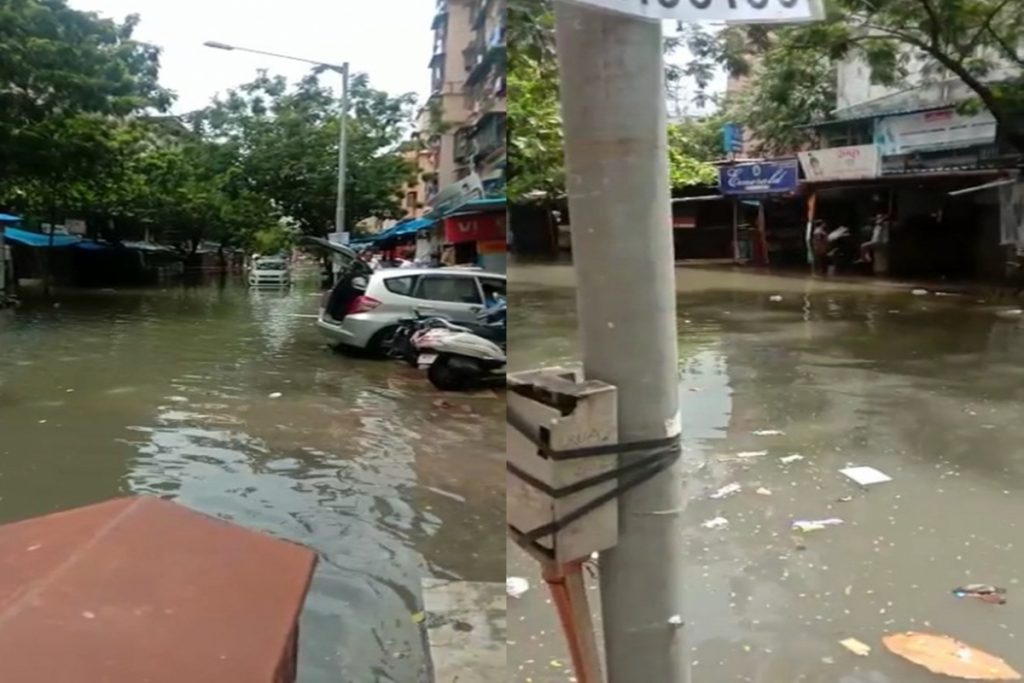


Mumbai experienced its heaviest 24-hour rainfall since 2019, with one base weather station recording 268mm of rainfall. The city's regular life was disrupted, with transportation severely affected, as a result of the torrential rains. The state government held a review meeting and the Indian Meteorological Department (IMD) issued an orange alert for the city. Several flights were cancelled and train services disrupted, causing chaos in the city.
Mumbai Struck by Torrential Rains, City Life Disrupted
Background
Mumbai, India's largest metropolis, is renowned for its heavy monsoon rainfall. However, in recent years, the intensity and frequency of these rains have increased, leading to devastating floods and infrastructure damage.
Current Situation
On June 28, 2023, Mumbai experienced its heaviest 24-hour rainfall since 2019. One base weather station recorded a staggering 268mm of rainfall, disrupting life in the city. Transportation was severely affected, with buses, trains, and flights being canceled or delayed. The state government convened a review meeting to assess the situation, while the Indian Meteorological Department (IMD) issued an orange alert for the city, indicating moderate to heavy rainfall.
Impact
The torrential rains caused widespread chaos in Mumbai. Roads and underpasses were flooded, making it impossible for commuters to travel. Rail services were disrupted, with trains running behind schedule or canceled altogether. Several flights were also canceled, leaving passengers stranded. The rains also led to waterlogging in homes and businesses, causing damage to property and infrastructure.
Response
The Brihanmumbai Municipal Corporation (BMC) and other government agencies worked to clear waterlogged areas and restore normalcy in the city. However, with heavy rainfall continuing, the situation remained challenging. The IMD issued a warning that the rainfall would continue over the next few days, raising concerns about further disruptions and potential flooding.
Top 5 FAQs
1. What is the reason for the heavy rainfall in Mumbai? Mumbai's heavy rainfall is caused by the monsoon season, which typically occurs from June to September. Monsoon rains are characterized by high humidity and strong winds, which bring large amounts of rainfall.
2. What are the risks associated with heavy rainfall in Mumbai? Heavy rainfall in Mumbai can lead to flooding, landslides, waterlogging, and damage to infrastructure. It can also cause traffic chaos, power outages, and disruption of essential services.
3. What can be done to mitigate the impact of heavy rainfall in Mumbai? Several measures can be taken to mitigate the impact of heavy rainfall, such as improving drainage systems, implementing flood control measures, and raising awareness about safety precautions.
4. What was the worst rainfall event in Mumbai's history? The worst rainfall event in Mumbai's history occurred in July 2005, when the city received 944mm of rainfall in 24 hours, leading to widespread flooding and the loss of over 1000 lives.
5. What is the long-term trend of rainfall in Mumbai? Over the past few decades, Mumbai has witnessed an increase in the intensity and frequency of heavy rainfall events, which is attributed to climate change.

During his maiden visit to Ethiopia, Prime Minister Narendra Modi and his counterpart Abiy Ahmed Ali announced the elevation of India and Ethiopia's relations to a strategic partnership. This move is expected to bring new depth and energy to the bilateral ties, reflecting the shared history and promising future between the two nations. The leaders also discussed issues of mutual and bilateral interest, including trade, investment, innovation, education, and defence cooperation. They also highlighted the importance of global solidarity and collaboration in the fight against terrorism.

Prime Minister Narendra Modi has arrived in Ethiopia on a two-day State Visit, the first by an Indian Prime Minister since 2011. The visit, at the invitation of Ethiopian Prime Minister Abiy Ahmed Ali, highlights the growing strategic importance of India-Ethiopia relations. PM Modi is expected to hold comprehensive discussions with Prime Minister Abiy Ahmed and meet with the Indian diaspora, while also reaffirming India's commitment to strengthening friendship and cooperation in the Global South.

The Justice Makers Bangladesh in France has strongly criticized the Muhammad Yunus-led interim government of Bangladesh for suppressing freedom of expression and adopting an authoritarian and fascistic path. This condemnation comes after journalist Anis Alamgir was arrested under the country's Anti-Terrorism Act for criticizing the government's human rights violations. The rights body has demanded the immediate and unconditional release of Alamgir and urged the international community to take action to ensure accountability and protect freedom of expression in Bangladesh.

India's remarkable economic transformation and its impact on the world stage is the focus of this e-paper. From the shifting global power dynamics to the rise of Indian businesses, this edition provides a comprehensive look at India's place in the international arena. With insights from experts, analysis of key events, and a spotlight on Indian businesses, this e-paper delivers an in-depth perspective on India's rise as a global powerhouse.

In a historic event, Indian Prime Minister Narendra Modi has been bestowed with Ethiopia's highest honour, 'The Great Honor Nishan of Ethiopia.' He is the first global leader to receive this prestigious award, which recognizes his exemplary leadership and contribution to strengthening India-Ethiopia partnership. In a ceremony held in Addis Ababa, PM Modi expressed his gratitude and dedicated the award to all those who have nurtured the bilateral ties between the two countries. This recognition marks a significant milestone in the positive partnership between India and Ethiopia, and reflects the strong bond between the two nations.

Prime Minister Narendra Modi's two-day state visit to Ethiopia has been warmly welcomed by the country's government and the Indian community. According to Tariku Deressa, CEO of Gandhi Memorial Hospital, the visit will strengthen the ties between the two nations and particularly benefit the medical industry. The cooperation between India and Ethiopia in the medical sector has been significant, with many Ethiopian doctors receiving training in Indian universities and the country importing medical equipment and products to improve the healthcare system. PM Modi's visit will further magnify these efforts and provide new opportunities for collaboration.

Indian Prime Minister Narendra Modi and Jordan's King Abdullah II bin Al Hussein met in Amman to discuss issues of mutual interest and strengthen ties between the two nations. Both leaders discussed the issue of terrorism and extremism, with PM Modi acknowledging King Abdullah II's efforts to promote moderation. The meeting also saw the signing of agreements and MOUs, paving the way for further economic cooperation and partnerships between the two nations. King Abdullah II emphasized the strong partnership and friendship between India and Jordan, expressing his enthusiasm for developing new avenues of collaboration for the benefit of their peoples.

Indian Prime Minister Narendra Modi's first full-fledged bilateral visit to Jordan in 37 years includes a meeting with Jordan's King Abdullah II to review relations and discuss ways to deepen cooperation in various sectors. During the visit, five agreements were signed, highlighting the shared commitment to combating terrorism and increasing trade and investment between the two nations. PM Modi also addressed the India-Jordan Business Forum and is now headed to Ethiopia for a two-day state visit. Follow us on Instagram for updates on Modi's trip.

In an exceptional show of hospitality, Crown Prince Al Hussein Bin Abdullah II personally drove Prime Minister Narendra Modi to the prestigious Jordan Museum. PM Modi shared pictures of the ride with His Royal Highness on social media, expressing his gratitude for the experience. The Jordan Museum is a hub for preserving and sharing the rich cultural heritage of the country, providing education and research opportunities for visitors. As PM Modi concludes his visit to Jordan, he highlighted the fruitful outcomes and strengthened collaboration between the two nations.

A terror attack at Bondi beach in Sydney, Australia has left at least 15 people dead, with 25 others still hospitalized. One of the alleged gunmen was previously investigated by Australia's national security agency, but was not deemed a threat. Vigils were held across the country to honor the victims, while the investigation now focuses on how the attackers were radicalized and the potential role of extremist ideology. The Five Eyes intelligence network will assist in the investigation as the nation's leaders vow to tighten gun laws.